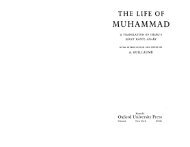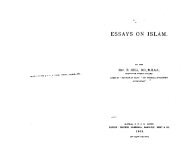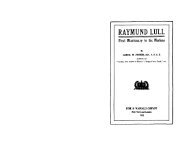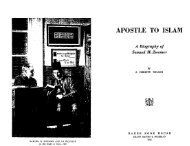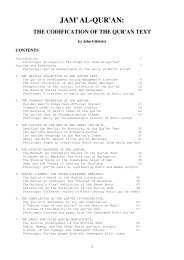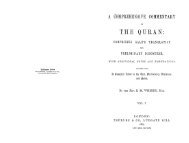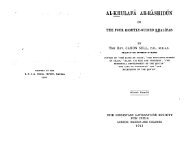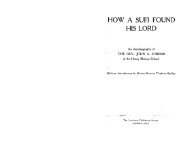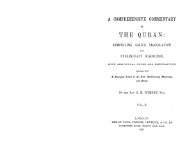Islam Its Belief and Practices - Radical Truth
Islam Its Belief and Practices - Radical Truth
Islam Its Belief and Practices - Radical Truth
You also want an ePaper? Increase the reach of your titles
YUMPU automatically turns print PDFs into web optimized ePapers that Google loves.
140 ISLAM ITS BELIEFS AND PRACTICES MISCELLANEOUS SUBJECTS 141<br />
likewise for two men to embrace each other. The joining<br />
of h<strong>and</strong>s, however, by way of salutation is permitted.<br />
Mu!;J.ammad said: "Whosoever joins his h<strong>and</strong> to that of<br />
his brother Muslim <strong>and</strong> shakes it, shall be forgiven of<br />
his sins."<br />
Sale.<br />
A Mussalman is not allowed to pay his debts by the<br />
sale of wine: but a Christian may pay his debts in this<br />
manner.<br />
It is abominable to monopolize the necessaries of life,<br />
<strong>and</strong> food for cattle, in a city where such monopoly is likely<br />
to prove detrimental. Similarly it is abominable to forestall<br />
the market.<br />
It is not the'duty of sovereigns to establish fixed<br />
prices to be paid by the community, except in cases of<br />
necessity.<br />
A house may be let to hire anywhere out of a city for<br />
the purpose of a pagoda or a church or even to sell wine<br />
in it.<br />
'<br />
If an infidel hire a Mussalman to carry wine for him,<br />
<strong>and</strong> afterwards pay him for his labour the money so<br />
obtained is lawful.<br />
Usury.<br />
The Qur'an strongly forbids usury (Sura 2: 276). In<br />
the language of the law, it signifies an excess, according to<br />
a legal st<strong>and</strong>ard of measurement or weight, in one of two<br />
homogeneous articles (of weight or measurement of capacity)<br />
opposed to each other in a contract of exchange, <strong>and</strong><br />
in which such excess is stipulated as an obligatory condition<br />
on one of the parties, without any return,-that is,<br />
without anything being opposed to it. The sale, therefore,<br />
of two loads of barley (for instance) in exchange for<br />
one load of wheat does not constitute usury, since these<br />
articles are not homogeneous: <strong>and</strong> on the other h<strong>and</strong>, the<br />
sale of ten yards of Herat cloth in exchange for five yards<br />
of Herat cloth is not usury, since, although these articles<br />
be homogenous, still they are not estimable by weight or<br />
measurement of capacity.<br />
Inheritance.<br />
Fara'i4. The term Fara'i4 is an abbreviation of<br />
'Ilmu'l-Fara'i4 or the science of the portions, ordered,<br />
appointed for the heirs by divine comm<strong>and</strong> in the Qur'an<br />
(Sura 4: 8-18).<br />
The law of inheritance, even according to Muslim<br />
doctors of law, is acknowledged to be an exceedingly<br />
difficult subject to study. We, however, quote the brief<br />
summary of it as given by Klein in the Reli~ion of <strong>Islam</strong>:<br />
"The property of the deceased Muslim is applicable, in the<br />
first place, to the payment of the funeral expenses; secondly,<br />
to the discharge of his debts; thirdly, to the payment<br />
of legacies as far as the third of the residue. The remaining<br />
two-thirds, with so much of the third as is not<br />
absorbed by legacies, are the patrimony of the heirs. A<br />
Muslim is, therefore, disabled from disposing of more than<br />
a-third of his property by will.<br />
The residue of the estate, after the payment of funeral<br />
expenses, debts <strong>and</strong> legacies, descends to the heirs <strong>and</strong><br />
among these, the first persons for whom the law has provided<br />
specific shares or portions <strong>and</strong> who are, therefore,<br />
called sharers (dha wu'l-furUdh). After the sharers have<br />
been satisfied, any residue remaining is divided among the<br />
distant relations.<br />
During his life-time a Muslim has absolute power<br />
over his property, <strong>and</strong> may dispose of it as he likes. He<br />
must, however, deliver the property to the donee in his<br />
life-time. As regards testamentary dispositions in the



